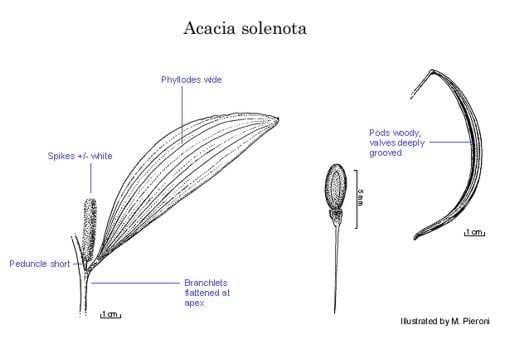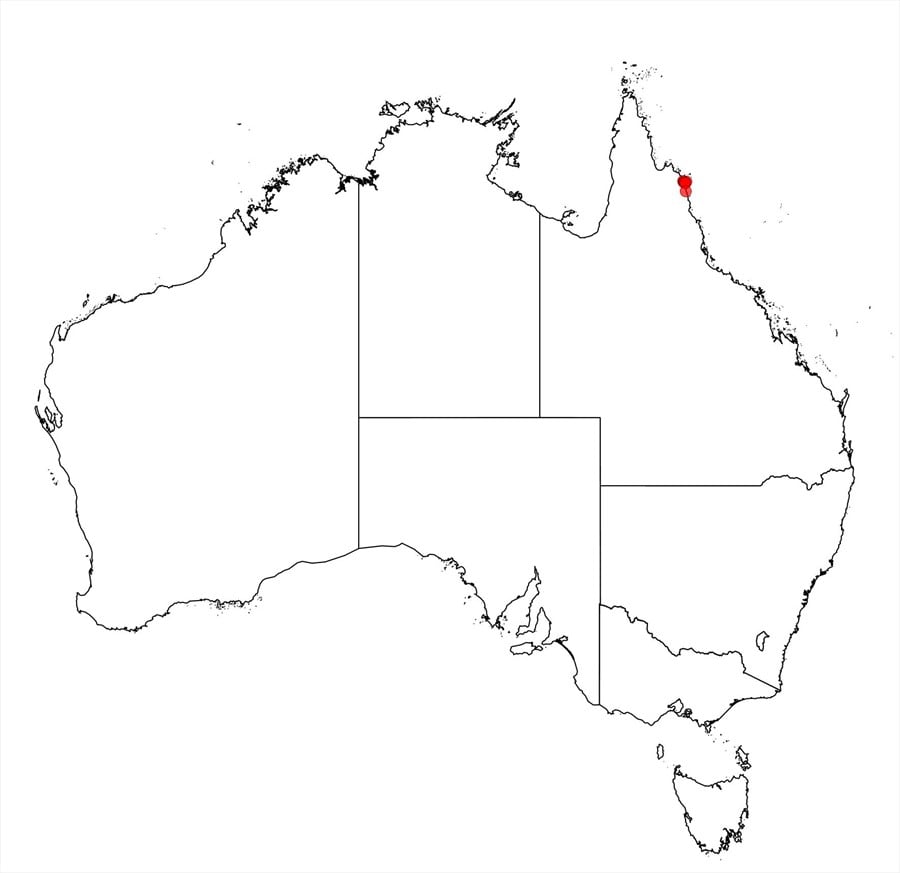Acacia solenota Pedley
WATTLE
Acacias of Australia
Family
Fabaceae
Distribution
Occurs between Cooktown and Cape Flattery, Qld.
Description
Shrub to c. 5 m tall, dense, spreading. Branchlets glabrous, complanate; young growth reddish brown and scurfy. Phyllodes dimidiate, 8–10.5 (–12.5) cm long, (15–) 20–32 mm wide, obtuse with a small callus mucro, glabrous; nerves many, fine, longitudinal, non-anastomosing, 2 or 3 more prominent than the rest; gland basal; pulvinus 3–7 mm long. Spikes 2.5–3.5 cm long, almost white; peduncle 6–8 mm long, subtended by small ovate bract. Flowers 5-merous; calyx broadly cupular, c. 0.4 mm long, sinuolately lobed, hirsute at base; corolla c. 1.8 mm long, deeply lobed, glabrous; stamens c. 3 mm long; ovary glabrous. Pods erect, linear, tapered towards base, to 12 cm long, 4–6 mm wide, quadrangular due to prominent marginal ‘wing’, the ‘wing’ 4–6 mm wide on each valve and with a deep longitudinal groove on surface of valve between them, woody, straight but curved upon dehiscence, sparingly striate, glabrous, reddish brown, opening elastically from apex. Seeds longitudinal to slightly oblique, seated in well-marked depressions within pods and remaining attached by a straight funicle following dehiscence; aril cupular.
Phenology
Flowers collected in Feb.; immature fruits collected Aug.; dehisced pods Oct.
Habitat
Confined to quaternary sand-dunes, sometimes in dense pure stands, in scrubs.
Specimens
Qld: 12.5 km NW of beach on track from Starcke Stn to McIvor R. mouth, J.R.Clarkson 5145 (BRI, K, MBA, MEL, NSW, PERTH, QRS); Leprosy Ck, Cooktown, McLean AQ441388 (BRI).
Notes
Acacia solenota is closely related to the more widespread and variable A. calyculata but is a larger plant which is readily recognized by its larger pods that are distinctly quadrangular, by a prominent vertical flange (a ‘wing’) along each margin of the valve and a deep longitudinal groove on the valve face between the ‘wings’. The phyllodes of A. calyculata are sometimes the same shape and size as those of A. solenota but more commonly they are smaller and/or more falcate.
FOA Reference
Data derived from Flora of Australia Volumes 11A (2001), 11B (2001) and 12 (1998), products of ABRS, ©Commonwealth of Australia
Author
L.Pedley
This identification key and fact sheets are available as a mobile application:
URL: https://apps.lucidcentral.org/wattle/
© Copyright 2018. All rights reserved.







